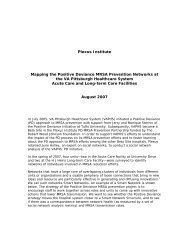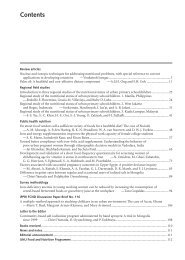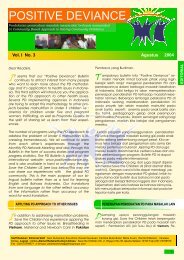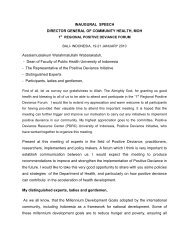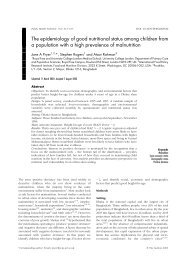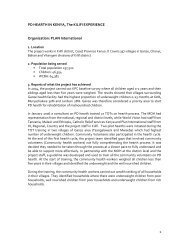Module 3 - Positive Deviance Initiative
Module 3 - Positive Deviance Initiative
Module 3 - Positive Deviance Initiative
You also want an ePaper? Increase the reach of your titles
YUMPU automatically turns print PDFs into web optimized ePapers that Google loves.
Optional- Also displayed are all written quotation that came up in training<br />
and mohalla sessions. This really makes activists feel happy, important,<br />
and proud to see their mohalla session record. The purpose of all these<br />
efforts as is to prepare them for the future and make them realize their<br />
achievements so far.<br />
Activity 2: Exploring roles and responsibilities of stakeholders<br />
The trainer divide the participants into 2 groups: the PD activists and the<br />
other members of the VHC. Their task is to devise roles and<br />
responsibilities of VHC coordinator and team members. (See Appendix 1<br />
for details)<br />
Helpful<br />
hints<br />
Activity 3: Balloon Game (See Appendix 5)<br />
This game is used to boost team spirit and to demonstrate that the<br />
community n to monitor pregnancy outcomes to ensure having healthy<br />
babies<br />
Session 2: Participatory Monitoring and Evaluation<br />
Competency<br />
Materials<br />
Process<br />
Helpful<br />
Hints<br />
At the end of the session, participants will be able to:<br />
- Use the monitoring tools appropriately<br />
- Explain how they are going to monitor the project<br />
- Suggest how they are going to evaluate the project after 6 to 12 months<br />
!. Exploring concept of monitoring and evaluation<br />
Trainer asks participants to share their experiences with monitoring in<br />
every day life. “What do you monitor in your daily life?”.<br />
Example of monitoring for women: monthly menstruation, daily water<br />
supply for the house, child’s fever, weight gain during pregnancy.<br />
For men: field/crop ( irrigation levels, plant growth, insect infestationdaily,<br />
weekly), monthly earnings, etc.<br />
From the examples draw a definition of monitoring: Regular activity of<br />
checking specific information (daily, weekly or monthly).<br />
Trainer stresses the importance of REGULAR ASSESSMENTS in<br />
monitoring activities.<br />
Trainer asks participants to share their experience with evaluation by<br />
asking: “What do you evaluate every year?”<br />
For men answers may include harvest output compared to previous year,<br />
income, savings.<br />
Women: child’s school performance, accumulated assets (jewelry,)..<br />
3




